All schools have now been closed for a number of weeks in the UK, apart from the children of essential workers, meaning parents have been faced with not only looking after their children at home but also providing education. And this includes keeping them motivated while isolating.
Keeping children focused while they continue to study and also provide them with productive activities can be a difficult task. However according to Dr Kathryn Weston, CEO of Tooled Up Education, this can also be a great opportunity to teach your children life skills. This could encourage your children to use research skills.
Although the current situation with coronavirus can cause stress and anxiety for children, it is important that parents keep calm and positive, and control their emotions in front of their children. “Parents have to model a sense of hope and positivity, as hard as that is,” Weston said, explaining that teaching children about emotional resilience can help them to learn the areas of life they can control in uncertain times (CNBC, Mar 30 2020).
The restrictions during lockdown, which limits us to the amount of times we can leave the house to visit supermarkets and, in some instances, how many items we can buy, offers an opportunity to teach children about rationing, cooking and budgeting. Other suggestions include sewing, knitting and gardening as these are skills that can encourage children to be self-sufficient.
Routines:
It can be difficult for parents to maintain a routine when having to spend the entire day at home and keeping a structure can be hard to do. Trying to have a classroom setting is not practical but having a plan each day can be useful. Natalie Costa, an Education Coach, speaking to the ‘Independent’ informs that older children can create a timetable to help form a structure. Another useful idea is having family meetings where everyone can discuss how they feel about the changes taking place.
Sam Cartwright Hatton, Professor of Clinical Child Psychology at the University of Sussex, speaking to the BBC advocates children having clear routines. Particularly younger children having a couple of hours school work in the morning and a specified time for craft work in the afternoon.
The National Literacy Trust have launched an online zone for parents who would like to find ideas and activities for their children while they are isolating at home. These include reading and writing activities, book lists, reading challenges, videos and competitions. The BBC is extending its educational programmes by launching a whole new iPlayer experience for children. The BBC Bitesize is a free online study support resource for school age children.
Children and online safety:
As children will be spending more time at home, this will be the ideal time to teach children how to stay safe online. As they will be accessing the internet more frequently it is important to teach them how to navigate this safely. This could also be a time to teach them how to use and improve their digital skills.
Setting up playdates with their friends via Skype or Zoom can help while children are in self isolation.
The importance of exercise:
Exercise is not only important for a child’s physical health but is also important for their mental health. According to the official NHS guidance, there are two types of physical activity that children and young people need to do each week in order to stay healthy. This includes aerobic exercise such as running, and exercises to strengthen their muscles and bones. The advice is to aim for at least 60 minutes of moderate-intensity physical activity a day across the week. The guidance also advises parents to reduce the time their children spend sitting and lying down and break up the length of time they spend not moving with some form of activity such as walking or bike riding.
Finally, while parents may be anxious to ensure that their children are learning at home, they are advised not to place too much emphasis on doing academic work: “Parents and carers are not teachers, and it is important to also spend time building relationships, enjoying shared activities and reassuring children.”
References:













